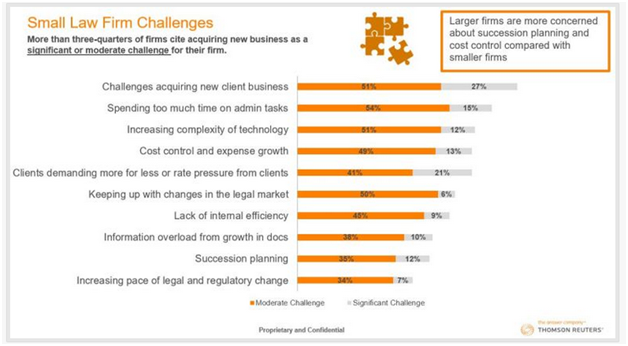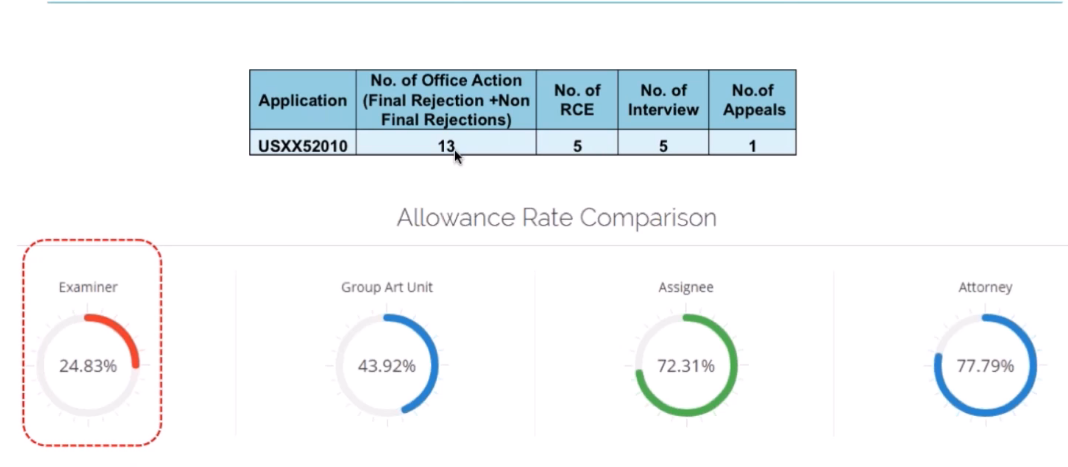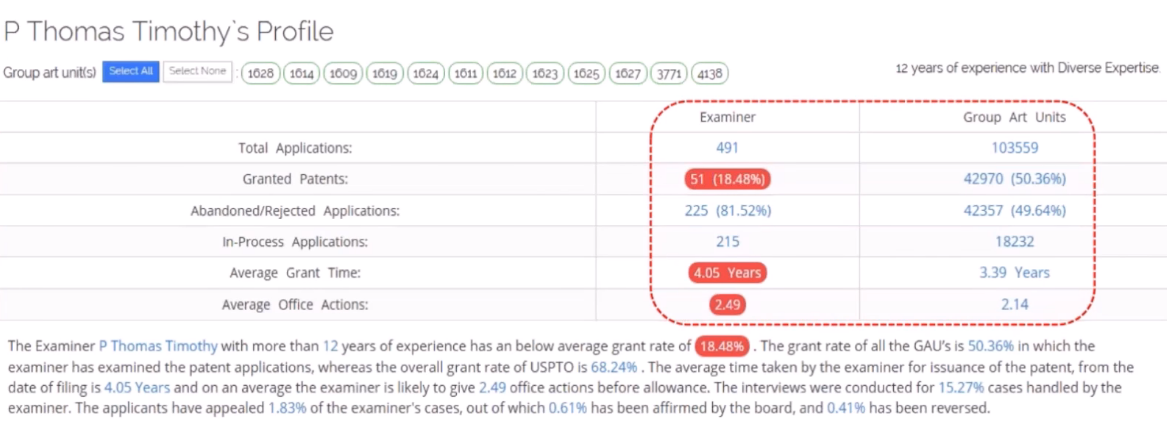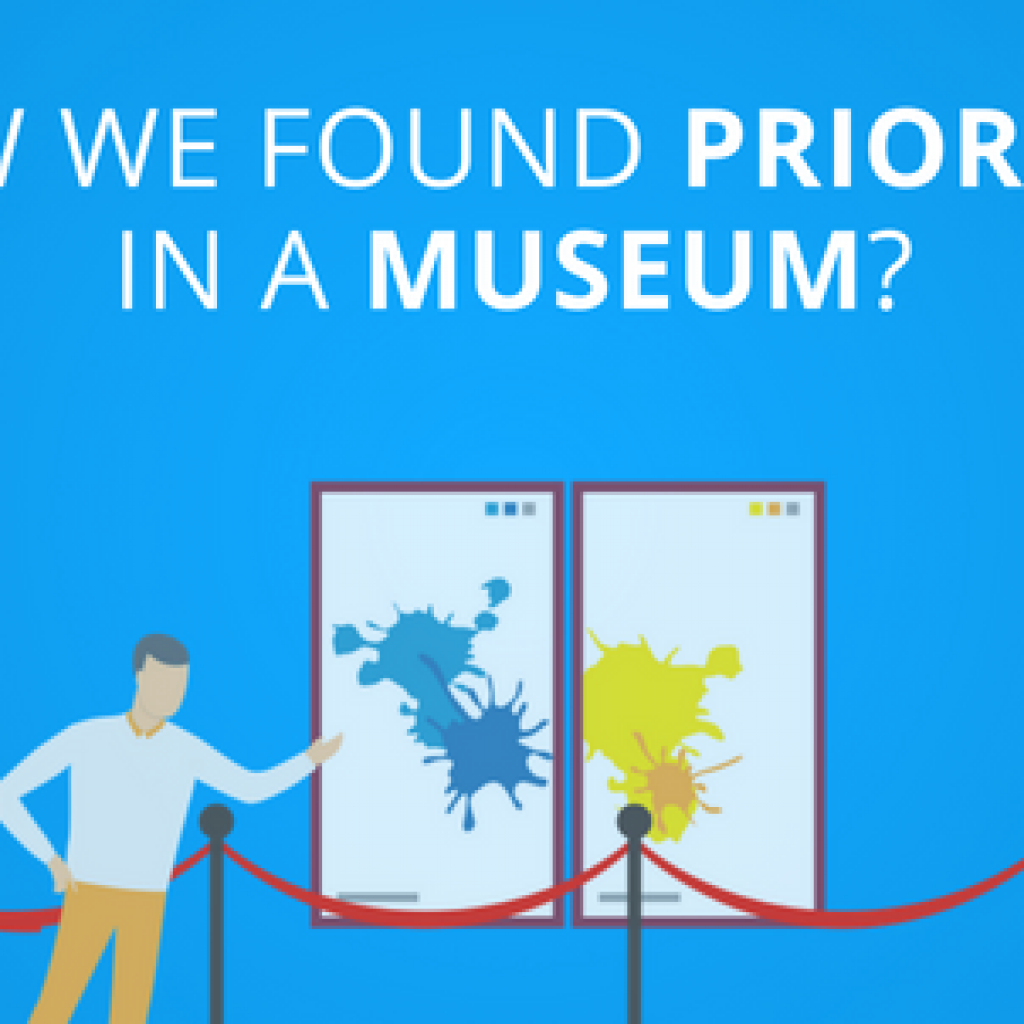This is the first article of a 3 part series on Smart Business Development Strategies for IP Law Firm which discusses how you can spot your differentiation factor. The second article in the series explains strategies to get more business from existing clients which you can read by clicking here. The third part of the article is on how to use data to build more clients for your IP law firm which could be read by clicking here.
Also, to save you from hassle of switching between the 3 parts, we converted this whole series into one ebook so that you can read/print it later. You can download the ebook by filling this tiny form below –
Business development is something everyone struggles with and law firms are no exception. According to a Thomson Reuters survey, 78% of the law firms identify acquiring new clients as their greatest challenge.
You see, every business – big or small – wants a huge clientele, for which it pursues new prospects by showcasing their uniqueness and potential. And how do they go about it?
They spend numerous hours trying to craft and refine special pitches portraying them to be the best among the rest. The creme de la creme. But there’s a problem with that approach.
What is the problem? – You ask.

The problem isn’t in refining a pitch for hours. The problem is that you are not the only one who is following that approach.
What you will discover at some point, is that most of the attorneys and law firms are pitching identical value proportions via an identical speech and presentation. Pitches then start losing their relevance by adding to the noise. They become predictable and boring to the level that your pitch has no return on investment, in terms of time and resources spent.
The most obvious approach is often most boring.
What could be done to avoid being boring?
Well, I might have just the answer to your question. Stay with me, as I show you how to craft a pitch that cuts through the clutter and makes the impact you want. I would also be showcasing a tool which would help you appear way more knowledgeable than your peers and differentiate you from the rest – something everyone struggles with.
The Biggest Problem with Current Pitches – Lack of Connection
One mistake even experienced salespeople make is of not trying to connect with a prospect. Instead what they do is: talk about themselves, their value proportion and things they are good at.
In fact, the secret of a good pitch is to start with a prospect’s weak areas and the problems they might be facing.
How to spot those, Deepak if I’m pursuing a new prospect? – You ask.
Apt question! You have to do some research for that. In the majority of the cases, if you ask me, they themselves may not be aware of the majority of their problems. So when you discuss problems they face, they feel a connection. Not to mention the fact that it portrays you have done your homework beforehand, a sign that you care.
Let’s take an example. Suppose you are approaching a particular corporation which has, for example, hundreds of patents. If you want to approach them for selecting you as a potential law firm to handle their patents, you should talk about how the company can improve their patent portfolio or generate extra revenue from their patents. That should be the conversation starter.
If you pick all the patents filed in last three years of a particular company and represent the number of office action and their grant time, you can easily figure out few applications having above average office actions and grant time.
Chances are you may find applications with 13, 14 or 15 office actions. I have come across such patent applications at multiple times. Most of the companies with such patent applications are unaware of these things. They are handling so many dockets that they can hardly care or are aware that something like this is happening.

When you inform them of these cases with the reasons, you make an impact and build a connection – a connection of trust that you know their unknown struggle and also have a solution. Identify such office actions, find the reason, and in the next step provide a solution.
You could provide an approach to how to get such a patent granted much earlier. Doing this would make them feel how they can save a lot of money by hiring you as compared to hiring somebody else.
Now that we know the secret to craft a perfect pitch, the next question that stands is: How you will convince them that you could help them with a faster prosecution process?
How to solve the Prosecution problem?
Data is the answer. You need to have an access to few platforms that provide you the data and simplify the analysis.
One such platform is the Examiner Analysis Tool. It helps you find which examiners are tough, which examiners have a better grant rate and other important points like which examiners prefer what.
You can easily advice when an application being examined by a particular examiner is easy to receive a grant. If an examiner is tough, you can craft a strategy by studying an examiner in detail to exactly identify what clicks with that particular examiner.
This is an easy strategy if you have data. Examiner Analysis can pull out patent applications of a particular company for you, their prosecution status, and examiners analyzing them. You will be able to advise what an examiner will do next and will appear way more knowledgeable than your peers that may not be using the data in practice.
Let us take an example to drive the point home.
Examiner Analysis Tool at Work
Consider an attorney dealing with examiner Thomas Timothy, for instance. Using Examiner Analysis Tool, we found the examiner having pretty bleak grant rate of 18%. From the data, it could be inferred that the attorney’s chances of getting a patent application through his desks are low.

What would you do next, if you were the attorney in question?
Can you get the patent granted or not? If you can answer your potential client, you give him one more reason to trust you. Having access to a data analytics platform can help you figure the working pattern of an examiner and craft relevant strategies for faster prosecution.
Another benefit is that you blend your experience with factual data which works. When I say this works that means this influence the decision of the people you are pitching to.
Conclusion
The confluence of your experience with data analysis is a powerful combination that can help you get to the next dimension where smart patent prosecution strategies exist. When you share these methodologies with your client/prospects, you are not just another patent prosecutor or another law firm but a smart patent prosecutor from an intelligent next-gen IP law firm.
Now, there’s another aspect of prosecution process that takes a toll on a lawfirm’s efforts and time – IDS filings. Management of reference cited in IDS documents, keeping a track of office actions and updating the IDS, and doing all of this in timely manner especially when dealing with 100s of applications is something that takes a lot of man-hours of lawfirms. And since there’s no room errors, managing IDS the smart way becomes even more important.
How can you efficiently manage your IDS filings while still keeping it error free and easy on your team’s resources? Let us show you how:

Authored by: Deepak Syal, Director, Operations.










